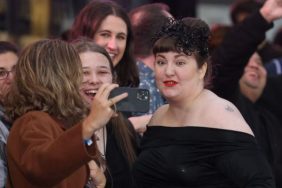Pick any movie you love, and the odds are exceptionally good that you mostly love it because of the screenplay. Sure, the images and the performances can be beautiful, exciting and even profound, but without a great story they don’t mean much, literally and figuratively. A good screenwriter weaves wonderful worlds for filmmakers to photograph, and develops complex characters for the actors to perform.
John August understands this, and not just because he’s the writer of hit films like Charlie’s Angels and Big Fish. He also hosts the hit podcast Scriptnotes, a weekly series about the craft of screenwriting, and also hosts Q&A’s with other cinema storytellers of note. If you want to talk about the art of writing movies, August is right man for the job.
We caught up with John August just before his recent Q&A with The Martian screenwriter Drew Goddard (whom we also interviewed, immediately after the show) to talk more about his craft, as a writer and an interviewer, and also to get an update on his upcoming horror film for kids, Scary Stories to Tell in the Dark, based on the iconic book series.
John August’s extended interview with Drew Goddard is now available for download at WGFoundation.org!
Related: Interview | Drew Goddard on ‘The Martian’ and ‘The Cabin in the Woods 2’
Crave: So you’ve been making a cottage industry out of interviewing screenwriters and their side of the industry on your podcast for quite a while.
John August: Absolutely. Not really “industry.” Industry implies that you actually make money out of it. I’ve tried to actually record the conversations I would normally be having with the people and share them. I think that’s what you want to do in the world when you have good information about how people are making movies.
I always like interviewing screenwriters because you guys actually get to make the creative decisions that drive the story. Sometimes when you’re interviewing an actor all they can do is talk about the surface. In your head, is doing a presentation with a screenwriter different than other forms of Q&A’s?
Absolutely. I think when you’re talking with a screenwriter you can talk about the idea at inception, and what was it about it kept them up nights and made them want to write this movie. You can talk about the journey of getting it to the place where you’re starting to shoot, and then the journey of what happens when a movie actually is being shot and when it’s finished and when it’s out there in the world. It’s a very different process for a writer than it is for a director, for an actor, for anybody else involved in a movie. So it gives you a broad perspective on that one movie in front of them, but also what their career is like.
Tonight we’re talking to Drew Goddard and we’ll talk from the very start about how you begin and what you learn from those initial jobs that take you through your later jobs. I think it’s hard for other crafts in the film industry to apply what they’re taking from one job to the next job.
“People on the outside might not really know how challenging it is to make any movie. The fact that some really good movies get made is really kind of remarkable.”
At what point in the process do most screenwriters get comfortable saying, “They screwed up my movie?” Assuming they did. Do you have to play nice for a while and then you can admit it later?
I don’t think there is any one set way to do it. I think you always have to be mindful of the fact that some movies are going to turn out great, some movies are going to turn out poorly, and sometimes you can very clearly point to, “this why that movie went off the rails.”
But I think the screenwriters I have spoken with, when they’re talking about movies that didn’t work, they’re incredibly generous to all of their collaborators, and recognizing that no one sets out to make a bad movie. Sometimes bad movies just happen. So I try to allow for a safe space where you can talk about, honestly, what the things were underneath that resulted in this movie not being what you set out to make.
How do you set up a safe space? What helps?
I think if you get into a project talking about the idea at inception… because when you’re talking about what attracted you to the idea, that may not be a reflection of the final film, so you’re looking at what was it that drew you to this book you are adapting, or this piece of property, or working with this other collaborator. What was it about this thing that seemed so promising at that time?
And then as you walk through, I think I’ve had enough experience seeing things go off the rails that I can gently raise the question of, at what point do you start seeing that things maybe weren’t working quite the way you hoped? And are you happy with the final picture? You can talk about those things, mostly, but never at the point of [pointing] fingers.
You never try to find blame. You’re mostly trying to explain what the situation really is, because people on the outside might not really know how challenging it is to make any movie. The fact that some really good movies get made is really kind of remarkable.
“I think that a lot of times people perceive that I just delivered a script and it went off into a factory and it came out as a movie.”
At what point do you decide that the audience, let’s say here at the WGA, has enough insiders that you don’t need to talk about the basics anymore? Or do you think that’s always important in every interview?
I think it’s important to talk about what the basics are for the individual writer that you’re talking with, and what those fundamental key values are. But when I’m talking to a group here I don’t feel like I need to break down protagonist/antagonist, sort of the basic fundamentals of what story is like.
That’s the nice thing about talking to a little bit more of an in crowd is that you can get into a little bit more of the nitty gritty on how you did things, and we can dig deeper on mythology and sort of assume that people have a baseline knowledge of how filmmaking works.
As someone who gets interviewed – for example, right now – about screenwriting, what are the sort of questions and topics that you wish people asked you about more?
I like when people ask me questions that are about process and about the work of writing, and not necessarily the end result. Because I think that a lot of times people perceive that I just delivered a script and it went off into a factory and it came out as a movie.
The conversations I have, the questions I love to have are about all the other aspects of a screenwriter’s job, which is so different than a novelist’s job. Yes, you are responsible for putting the words on a page but you’re also responsible for a thousand conversations and talking people through scenarios and the problem-solving, the social problem-solving that is key to a screenwriter’s career I think is sort of fascinating, and sometimes under-examined in other interviews.
Have you done other WGA Q&A’s before?
I have. I’ve done quite a few of these.
How do these differ?
These are good. Another set of Q&A’s I really enjoy, Film Independent does a series with directors right around in January, I guess, and those are also chock full of people who have just seen a given movie and have really smart questions for those filmmakers. I’ve really enjoyed that. Also, because I’m mostly a writer and not so much a director, I can really just ask questions I’m very curious about in terms of why directors choose to do things a certain way.

20th Century Fox
What are you curious about for someone like Drew Goddard, specifically?
I’m very much curious about his arc from television into features. My suspicion is that Drew arrived at the moment, a great moment where some really talented showrunners were moving into features, and he was a very talented writer who could move with them from television into features.
But those are very different beasts so I’m really curious to talk about what that’s been like, what it’s like to have written a movie that’s so well received that it got him certain big directing jobs that haven’t really happened yet. There’s a lot of interesting stuff to talk about.
How do you feel about Drew Goddard’s work on, for example, The Martian?
I think it’s fantastic.
What about it is fantastic?
As someone who’s not read the book I can say that I can very much envision what it’s like to be the person handed a property like that, and the many competing forces that would be pushing on a screenwriter to take it more this way or take it more that way. To put in a romance there. Could this be funny or could this be less funny? […]
So I think what impressed me was that it was able to stay so true to itself. Often you can see a movie and all the pieces can be really good but it does feel cobbled together from different ideas, different ways of making that kind of movie. This very much felt true to one spirit, and that’s a very difficult thing to do. Especially on a huge movie like that.
Have you seen a project of your own undergo that “too many cooks” approach?
Oh absolutely, for sure.

Columbia Pictures
What does that feel like?
It’s very frustrating because you see something that you had had very clear ideas about, at inception, about how it should grow. And it didn’t grow in that direction. I’ve said so on the record, so this is not a surprising thing, but going into the second Charlie’s Angels it seemed like we all had a really clear idea of what we wanted the second Charlie’s Angels to be. Before I started writing we were actually able to sign onto an agreement for, this is kind of movie we want to make.
And yet the truth is, sort of like three blind men describing an elephant, we all sort of thought that Charlie’s Angels was a different thing. So when it came time to make the sequel each of us was very much convinced that we sort of knew why the first movie had worked so well, and we tried to enforce that idea in the sequel. And the movie is, I think, schizophrenic to some degree because of that.
It’s a little confusing.
Yeah, it’s a lot confusing. If anyone dares to listen to the writer’s commentary on the Full Throttle DVD, the Wibberleys [co-writers] and I talk through the plot and try to figure out the plot of the sequel. Because it was genuinely cobbled together from two different drafts and some of it doesn’t actually make sense. Like the MacGuffin is just bewildering.
In all fairness, Raymond Chandler felt the same way about the film version of The Big Sleep, so really what we’re saying is that Full Throttle is as good as The Big Sleep.
Yes, and I find it so bizarre, but I guess wonderful in that everyone has different tastes, that there are people who love the sequel. God bless them. There’s something for everybody.

Stephen Gammell
I want to ask about something. It was announced that you were working on it but I don’t know if you are still working on it… Scary Stories To Tell In The Dark?
Yes!
Are you still working on that?
I am still working on it, yeah.
That was the scariest thing from my childhood basically. How scary are you allowed to be, do you think?
I think quite scary. Again, as a screenwriter I have no fortunetelling ability to know whether the movie is going to exist or if the movie is going to be good, but I can say that I’m really excited with what we’ve been able to do so far and if we are able to make the movie I kind of hope we’ll be able to make, it’s going to be something great, and a very unique movie that we haven’t seen before.
How do you approach adapting a book in which the illustrations are so much more vivid in people’s minds than most of the actual tales?
Without spoiling things I will say that the illustrations are an incredibly crucial part of the book and they are an incredibly crucial part of the movie. So…
Have you seen that they re-released the book with new illustrations that are nowhere near as scary?
Again, without sort of spoiling things about the movie, I will say that the difference between those original illustrations and the second set of illustrations are an important aspect of the movie experience.
Photo Credit: Araya Diaz / Getty Images
William Bibbiani (everyone calls him ‘Bibbs’) is Crave’s film content editor and critic. You can hear him every week on The B-Movies Podcast and watch him on the weekly YouTube series Most Craved and What the Flick. Follow his rantings on Twitter at @WilliamBibbiani.






